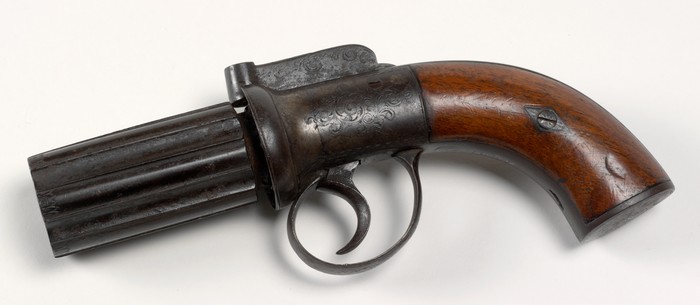Pepperbox revolver
Used by Wingy, a Tasmanian bushranger, c1840–50
Iron and wood, six revolving barrels and bar hammer
Bequest of Sir William Dixson, 1952
DR 127
Otherwise known as Daniel Stewart, Wingy arrived in NSW to serve seven years for horse stealing. He gained his ticket of leave in 1848 but was convicted for sheep stealing in 1851. This time he received a life sentence, which he was to serve on Norfolk Island. However he arrived in Van Diemen’s Land (Tasmania) in 1854 and the following year received a probation pass. He soon took up bushranging, along with ‘Flowers’, ‘Black Peter’ and ‘Sydney Jim’.
This revolver came into official custody following Wingy’s arrest in September 1858, when police finally caught up with him and Sydney Jim after an armed hold up near the town of Ross some months earlier. Constable McIvor managed to take Wingy alive. Sydney Jim (William Thornton) was killed.
It was reported that Wingy snatched up his revolver to shoot but McIvor managed to get him to drop it. It was later deposited with the clerk at Green Ponds police station. A forerunner of the modern revolver, the pepperbox is named because it resembles a pepper grinder in shape.
On 13 February 1859 Wingy,
Black Peter and Flowers were 'launched into eternity' (hanged), along with two others: John King, who had shot
his de facto wife, and William
Davis, an axe murderer. With five hangings held on one day, the Hobart
Courier called the executions 'the most exciting event of the week'.* Wingy
was buried in the Campbell Street burying ground, Hobart.
Footnotes
*
(Hobart) Courier, 18 February 1859, p
2
Wingy's final act of
recklessness was to refuse to shake hands with the priest officiating at his execution,
insisting, 'I don’t want to shake hands with anyone, this is worse than a
savage Government to hang men for doing nothing at all'.*
Footnotes
*
(Hobart) Courier, 13 February 1859, p
3
Bushranger aliases often added a splash colour
to their notoriety: 'Black' Caesar, Captain Thunderbolt, Captain Moonlite,
Black Douglas, Mad Dan Morgan, Jackey Jackey – the Gentleman Bushranger, Dido
and The Jewboy (along with his gang called The Jewboys). Australia’s most
famous bushranger, Ned Kelly didn’t have an alias.
The first bushrangers were convict
bolters, such as John 'Black' Caesar, who vanished into the bush around the
Sydney settlement. Although always a hazard in the colonies, bushranging peaked
in the mid 1800s during the goldrushes.
Mark Twain’s thoughts on the
pepperbox revolver: ‘Sometimes all its six barrels would go off at once, and
then there was no safe place in all the region round about, but behind it’.*
Footnotes
* Roughing It, American
Publishing Company, 1873,chapter
2
Following the trial, the bushrangers’ counsel, Mr Lees, lodged a petition to the Executive Council to commute the sentences, principally on the grounds that the bushrangers had not actually killed anybody, and had not ill-treated women in their various robberies. Lees obtained about 160 signatures. The Executive Council ‘carefully and solemnly’ reconsidered its decision, but deemed it was ‘not compatible with their duty, to the public to accede to its prayer’.*
Footnotes
* (Hobart) Courier, 14 March 1859



 Back to list
Back to list